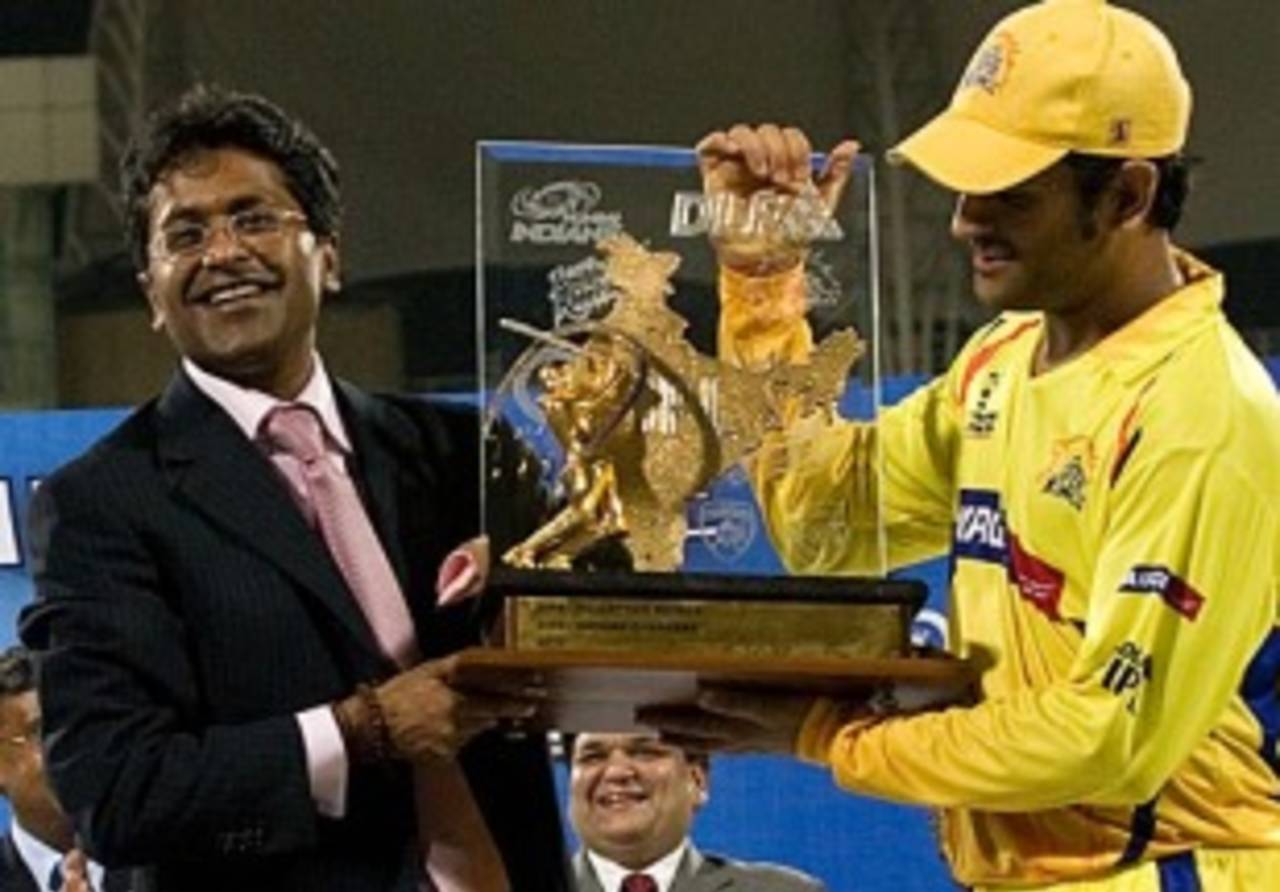Dasgupta defends role in selling mid-over ad spots
The man who helped with the mid-over advertising process has said he simply came to the IPL's aid by providing it with the technical ability to monetize the additional 150 seconds of advertising time per match
Tariq Engineer
01-Jun-2010

Lalit Modi called Kunal Dasgupta and asked him to help the IPL place ads between deliveries • Indian Premier League
A day after the BCCI asked Lalit Modi to explain the mid-over advertisements in the IPL's third season, the man who helped with the process has said he simply came to the IPL's aid by providing it with the technical ability to monetize the additional 150 seconds of advertising time per match. "I was just helping out the BCCI," Kunal Dasgupta, the CEO of Pioneer Diagsys, an agency that sells ads, told Cricinfo on Tuesday, while denying the board could have been unaware of his participation.
On Monday, the board sent Lalit Modi a third show-cause notice seeking an explanation from him on why he did not float a tender for the additional 150 seconds per match and kept the board in the dark on the deal, and why the money for the air time had not yet come in.
Dasgupta said there was no written contract for the job, despite his asking for one. "Emails are there," he said. "I asked for a contract. They said, 'Let's see how it goes.' Now they are talking in a different way." Pioneer did not purchase the rights to the air time; those, he says, remain with the board. The firm was merely providing a service.
The IPL, he said, was fully aware of his operations - the accreditation committee provided all-access passes to Pioneer's producers so they could attend matches. "I had seven or eight people at the games. What is the BCCI trying to say, that they didn't know about it?" He also said he had sent IPL CEO Sundar Raman and the league's chief financial officer copies of all bills raised on the sale of air time. "Every bill has been sent to the BCCI," he said. "We will see that the BCCI gets all its money." Raman did not respond to an email from Cricinfo seeking confirmation that he had received copies of the bills.
Dasgupta - who was the CEO of Sony when the IPL signed its television deal - said he got involved when Lalit Modi called and asked if he could provide the technical expertise for inserting 10-second ads between deliveries. "The first two days, the BCCI tried to do it and failed miserably," Dasgupta said. "That's when they called me and asked me to do it." He says Modi sought his help because of his years of experience in the media industry. He agreed because he thought "it was something worth trying. I had an idea of how to do it. Thought I could make it happen." In addition, he says he was asked to handle the selling of these 10-second spots to advertisers.
The air time was available to the board because it had retained the rights to 150 seconds per match over and above the 2,600 seconds per game sold to Multi-Screen Media (MSM) in the original IPL broadcast deal. The extra time came when the strategy break was cut from 7.5 minutes per game to 5. "It is advertising time the BCCI carved out for its own purpose," he said.
Pioneer managed to sell 4,700 seconds out of 9,000 seconds available from 60 matches. "It had to be when nothing was happening," Dasgupta, said, "which in Twenty20 cricket is a little challenging. The ads had to be run on the fly, without affecting the pace of play.
"It is a very specialised thing. You can do it when a fast bowler is walking back to his run-up. You can't do it when a spinner is bowling."
In order to broadcast the ads, Pioneer had its own producers attend the matches. During the course of play, the producer had to decide when there was a long enough break in the action to insert an ad. "It is predicated on events happening on the field and having the presence of mind to do it," Dasgupta said. In addition to getting passes from the board, he maintains that IMG knew who the production manager was on every match day.
The producer's hotel and travel costs were born by Pioneer with the expectation that the firm would be reimbursed by the board. However, Dasgupta alleged that Pioneer had not been paid for its services so far. He had written to the BCCI about it but was ignored. He said he intends to claim his expenses and whatever other legitimate dues are owed to him and is willing to go to court over it.
"If they didn't want to do it, why didn't they stop it after the third day? It should have been stopped after the third day. They allowed it to happen for 45 days and now they are all holier than thou."
Dasgupta said the deal netted about Rs 25 crores after tax for the BCCI, which, he added, exceeded his expectations. It's an amount in keeping with the industry averages, Hiren Pandit, Managing Partner at Group M, a prominent media buying agency, said, and reflects Sony's stated price of Rs 5 lakhs for a 10-second spot.
On the question of delayed payments, Dasgupta points out advertisers take 90 days to pay off their dues; it is standard industry practice. Since the IPL final was played on April 25, payment won't be made until at least July. "These are not fly-by-night agencies," he said. "We are talking about agencies like Lintas, Group M, Zenith, McCann Erickson."
Tariq Engineer is a senior sub-editor at Cricinfo